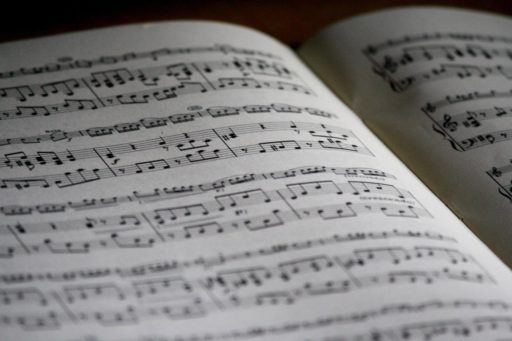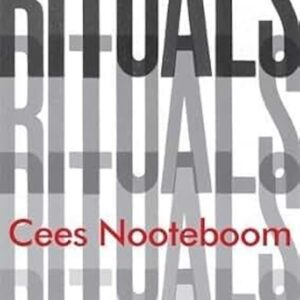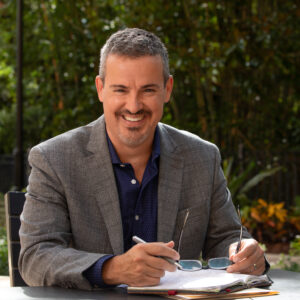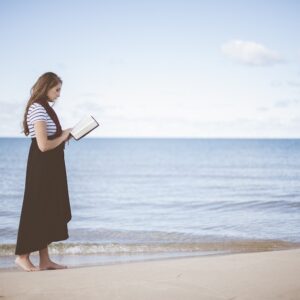Music was easily the most enjoyable aspect of writing my novel Absolute Music. I mean the sheer amount of contemplative time spent listening to the great range of music mentioned in the novel, all of which I’ve assembled in a Spotify playlist. Not included in that playlist is nearly an album’s worth of Bob Dylan songs which are only alluded to in the text, not mentioned outright.
I read a lengthy biography on Franz Liszt, only to cut from the manuscript the part where his music was mentioned. I read works on the life and music of Charles Alkan, the nineteenth century French Jewish composer who—so goes the apocryphal story—died by being crushed by his own fallen bookshelf when he tried to remove a volume of the Talmud, which is always kept at the top of the shelf. Alkan’s part in the novel was related to Liszt’s, and so he was cut as well. But I have included in the playlist a piece from each of these composers because their music and the contours of their lives and personalities mean so much to me.
That listening to music was such an important part of writing my novel suggests something I am often hesitant to admit: except for that time spent as it were researching music for my novel, the art form has largely fallen out of my life in the last five or so years. It may have something to do with becoming a parent, but if so then it is the opposite effect I thought becoming a parent would have. I thought I would revitalize something of my musical past. Certainly, I do try to expose my children, who are still very young, to a wide range of music. And soon they will be old enough to seriously learn to play instruments, which may have a salutary influence in my musical life.
Maybe the problem is that I don’t have much time, since becoming a parent five-and-a-half years ago, to contemplatively listen to music. When I’m with my kids I can’t really do it; when I’m not with my kids I’m working, and I’m not much good at listening to music and doing something else at the same time. I am daily astounded at the number of people who now go about listening to podcasts or audiobooks or music while performing other tasks. I cannot do this, and consequently I have not become part of the audiobook revolution, know nothing about podcasts and, as I say, have fallen out of touch with music in which I was once immersed.
From about the age my older son is now, I grew up with music. I have many memories of my mother playing piano and singing, playing guitar and even the accordion. My mother bought Enya’s first albums when they came out, and those had an immediate but also lifelong impact on me, since they were my first meaningful encounter with what I think of as a quintessential fantasy aesthetic and with foreign languages I would go on to study and cherish, Latin and Irish. It was thanks to my mother that I was able to study cello performance with the best teachers available, and thanks to her and them that I learned the canon of Western classical music.
I played in regional junior and amateur orchestras and studied music history, theory, and composition in high school. My first music history paper—still one of the things I’ve most enjoyed writing—was about Jelly Roll Morton and the origins of jazz in New Orleans. Between about 1998 and 2005 I saw Bob Dylan in concert roughly 35 times. Music was an active, passionate, multifaceted mode of life. I recall making more than a few versions of that lost love token, the mix tape—back when it was an actual tape. Maybe one of the reasons I don’t seem to be as close with music as I once was, is that some of the things I associated with it—the physical trappings and exertion, the youthful romance—lie, for me, in the high and far-off times.
But of course music is experienced differently and matters differently at different stages on life’s way, to steal a phrase from Kierkegaard—who loved music profoundly. Perhaps contemplative listening wasn’t something I did much of during my first aesthetic, erotic stage of life (as Kierkegaard thought of it). Musical contemplation came for me in the next stage, which began when I was an undergraduate and was no longer playing music myself. But I listened and studied it very intensively throughout my twenties and early thirties. In my youth I heard—indeed, I felt—most of all the grain of music, its timbre and texture, and I was alive to—in fact brought to life by—its emotional and interpersonal elements. During my long period of contemplative listening, music became structure, mathematics, metaphysics. And this does not correspond to the Kierkegaardian model, because his middle stage was the ethical, whereas mine I would call the contemplative or speculative or metaphysical.
So what then is my third stage, the one I’m in now? After all, it’s not as if a lot of music doesn’t get played in my house. We hear Klezmer, Hawaiian slack key guitar, Irish session music, Chinese music on the gu qin or the pipa, chamber music or sacred polyphony, and every now and then we both listen to and watch the duo Ki & Ki absolutely shred it playing what may be Japan’s version of the Delta Blues, the Tsugaru-shamisen style (seriously, look them up on YouTube)…. It’s just that there’s always something else going on: preparing food, reading to the kids or doing something else with them, tidying up, or reading or writing. I might call this the existential stage of my musical life. Kierkegaard’s stages go from the aesthetic to the ethical and finally the religious. Or maybe this is truly the religious stage, if we remember “religion” is something that ought to permeate every moment of life, a kind of integral consciousness.
For Kierkegaard the later stages recapitulate the previous one or two rather than negate them. The eros and the contemplation are not really gone from my musical awareness so much as woven into the rest of my life. I recall the old monastic motto is ora et labora—pray and work, not ora aut labora—pray or else work. Manual labor was supposed to be a kind of prayer, and the life of prayer is a kind of spiritual labor. My terms are music and regular household life. Music is in our life now, though it is maybe harder to see life as music. But, like the narrator of my novel, we do try to experience this life and this world as created, living, moving, interconnected, and—in its wholeness which so immeasurably exceeds the sum of its parts—echoing a cosmic music in praise of its maker.
Jonathan Geltner lives in Ann Arbor MI with his wife and two sons. His translation of Paul Claudel’s Five Great Odes is available from Angelico Press and a novel, Absolute Music, is available from Slant. If you enjoy his posts at Close Reading, check out his new Substack, Romance and Apocalypse, for more frequent and in-depth essays on the places where literature and other arts meet religious ideas and experience.





